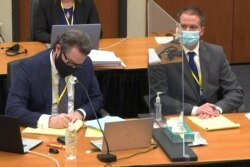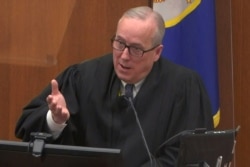A cardiologist testified Monday that George Floyd, a Black man who died in police custody in Minneapolis last year, did not die of a heart attack or a drug overdose and would have survived had he not been pinned to a city street as police officer Derek Chauvin pressed his knee to his neck for more than nine minutes.
Dr. Jonathan Rich, a medical school professor at Northwestern University, told the jury at Chauvin's murder trial in Minneapolis that had Floyd "not been restrained in the way in which he was, I think he would have survived that day."
"I think he would have gone home or wherever he was going to go had he not been subjected to the prone and positional restraint that he was," Rich said.
Eric Nelson, Chauvin's defense lawyer, has contended that the 46-year-old Floyd died from drug use and underlying health issues, not the manner in which Chauvin arrested him last May 25 on suspicion of passing a counterfeit $20 bill.
Chauvin, 45 and white, has pleaded not guilty to murder and manslaughter charges in the Floyd case, which triggered widespread street protests against police abuse of minorities across the U.S. and in major foreign cities.
Testifying for the prosecution, Rich contested the defense's conclusions about why Floyd died.
"After reviewing all of the facts and evidence of the case, I can state with a high degree of medical certainty that George Floyd did not die from a primary cardiac event, and he did not die from a drug overdose," Rich testified.
The cardiologist said there was no evidence to suggest an overdose caused Floyd's death, even though a toxicology report showed the presence of the opiate fentanyl in his blood.
"Number 1, it appeared to me that Mr. Floyd, who was an acknowledged frequent chronic user of substances, particularly opiates, likely developed a high degree of tolerance," he said.
"But the second and just as important, maybe more important, was I didn't see any of the signs of an opiate overdose when I reviewed the videos," Rich said.
Rich told the jury that police officers — Chauvin and three others on the scene — had the opportunity to take actions Rich believed "very likely" would have saved Floyd's life, even after he lost consciousness as he was held down by Chauvin's knee.
"There was one moment in the video where I heard one of the officers saying, 'I think he's passing out,'" Rich testified. "That would have been an opportunity to quickly relieve him from that position of not getting enough oxygen, perhaps turn him into a recovery position and allow him to start to expand his lungs again. When there were signs he was worsening, repositioning him, I think, very likely would have also saved his life."
Rich, who specializes in heart transplant surgery, said Floyd's heart was slightly enlarged but that he had no preexisting heart issue, and so a heart attack was ruled out.
"Every indicator is that Mr. Floyd had an exceptionally strong heart," Rich testified.
Earlier Monday, Hennepin County District Judge Peter Cahill rejected Nelson's request to sequester the 12 jurors and two alternates after police in a neighboring city fatally shot a Black man during a traffic stop.
In denying the defense's request, the judge said sequestering the jury "would only aggravate" any worries jurors had.
But Cahill said he intends to sequester the jury once it begins deliberations, likely in a week or so.






